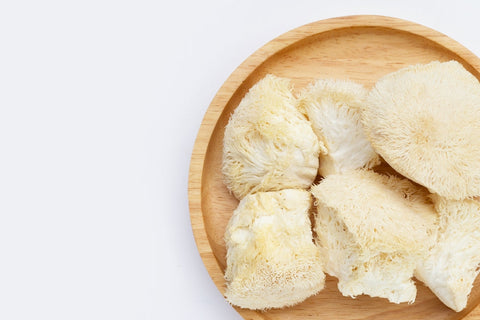Lion's mane mushroom, also known by its scientific name Hericium erinaceus, has captured the attention of the health world for its fascinating potential. Long valued in traditional medicine, the health benefits of lion's mane are now being explored by modern science, with researchers working hard to unlock its powerful secrets. But does this “smart mushroom” live up to the buzz? This week, we unpack the evidence — exploring how lion’s mane may sharpen our brains, protect our bodies, and boost our sense of well-being.
What Is Lion’s Mane?
If you’ve ever stumbled upon a white, shaggy mushroom clinging to a tree trunk in the forest, you might have met lion’s mane. Resembling a fluffy white pom-pom, this mushroom has been used for centuries in Asia. Today, it finds a new audience as a functional food, mushroom powder, supplement, and even as an ingredient in mushroom coffee.
The secret to lion's mane’s power appears to come from its unique plant compounds — including beta-glucans, erinacines, hericerins, hericenones, steroids, and terpenes [2]. Let’s journey through the promising research on this mushroom’s health effects.
Cognitive and Neurological Benefits: Can Lion’s Mane Help Your Brain?
Supports Brain Health
Perhaps the most exciting benefits of lion’s mane mushroom are its effects on brain health. Scientists have found that lion’s mane is rich in compounds called erinacines and hericenones [2][3]. These special substances may help our brains by stimulating the creation of nerve growth factor (NGF). NGF is like fertilizer for your nervous system, helping brain cells grow, repair themselves, and stay healthy [2][3].
Lion’s mane is one of several functional mushrooms used to support cognitive function and mental performance, alongside options like reishi and cordyceps. For more about the broader category of nootropics and brain-boosting supplements, see Nootropics: The Science and Stories Behind Cognitive Enhancers.
Improves Memory, Focus, and Clarity
It isn’t just theory; actual studies point to real improvements. Both animal and human trials suggest that regular lion’s mane supplementation may lead to better memory, improved attention, and sharper mental clarity [4]. People taking lion’s mane in these studies noticed they could remember more easily and focus with less effort. As a result, lion’s mane has become a favorite for those interested in nootropics — substances thought to boost brain performance.
If you're seeking an easy way to incorporate lion's mane into your routine for cognitive improvement, mushroom coffees and other supplement forms are an option. Learn how to choose the right format in Exploring Mushroom Supplements: Which is Best for You?.
Neuroprotective Effects: Protection Against Alzheimer’s?
Beyond memory boosts, lion’s mane could one day play a role in warding off serious neurological disease. Some research suggests that this mushroom may help protect the brain from neurodegenerative conditions, such as Alzheimer’s disease [1][4][2]. It appears to work by protecting neurons, preventing their early death, and encouraging the survival of healthy brain cells. While most of this research is in its early stages, the possibility is truly exciting.
Supports Mood, Fights Anxiety and Depression
There’s more: Lion’s mane may also be a friend to our mental health. Recent studies — including a 2023 clinical trial — show that lion’s mane might help reduce symptoms of anxiety, depression, and even daily stress [1][3]. Scientists believe this support stems from the mushroom’s impact on NGF and dopamine, two key neurotransmitters essential for maintaining a balanced mood.
If you’re interested in natural adaptogens for stress resilience, discover the calming benefits of ashwagandha in Discovering Ashwagandha Benefits: Ancient Wisdom Meets Modern Science.
Anti-Inflammatory and Antioxidant Effects: The Body’s Inner Firefighters
Reduces Inflammation and Oxidative Stress
We often hear about inflammation and “oxidative stress” as the root causes of modern diseases. Lion’s mane is packed with antioxidants and anti-inflammatory molecules that may help the body put out these inner fires [2][1][4][3]. Less inflammation can mean a lower risk of chronic illnesses like heart disease, cancer, or some autoimmune issues. Antioxidants, meanwhile, shield our cells from everyday damage and keep us feeling younger, longer.
Wondering how lion’s mane compares to other popular mushrooms for anti-inflammatory benefits? Get a quick overview of functional mushrooms like reishi, chaga, and shiitake in The Health Benefits of Mushrooms: A Quick Overview.
Supports Liver Health
Keeping our liver healthy is crucial — it’s the body’s number-one detox center! In animal and laboratory studies, lion’s mane has shown promise in protecting liver cells from toxins and reducing harmful inflammation [2]. While more human research is needed, these early findings make lion’s mane a rising star for overall well-being.
Immune System Support: Fending Off Germs, Naturally
Boosts Immune Defenses
A healthy immune system keeps us safe from everyday bugs and more serious illnesses. Exciting findings from animal and in vitro (test tube) research indicate that lion’s mane mushroom may “train” the immune system to work more effectively [1][4][3]. In one set of experiments, lion’s mane increased the activity of immune cells deep in the gut — our body’s first line of defense — and promoted the growth of “good” gut bacteria, further helping us stay strong.
Discover how mushroom coffee products, often containing lion's mane, may also support immune and gut health in Mushroom Coffee Benefits: A Brew of Health and Innovation.
May Protect Against Harmful Germs
Could a mushroom help you fight off infection? Some laboratory studies suggest that lion’s mane extracts may boost the production of the body’s infection-fighting cells and beneficial chemicals [4][1]. The result: a stronger immune response against dangerous germs and other threats. While this research is impressive, most of it has been conducted in animals or cells, and scientists stress that more studies in humans are needed.
Metabolic and Other Systemic Benefits
Supports Heart Health
Heart health matters at every age, and lion’s mane may lend a hand. Early research hints that this mushroom can help lower cholesterol and stabilize blood sugar levels — two risk factors for heart disease [2]. Although this is primarily observed in animals, the results are encouraging for future human studies.
If you are exploring functional foods that may benefit heart, brain, and metabolic health, consider shiitake mushrooms as well in Exploring the World of Shiitake Mushrooms.
May Slow Cancer Cell Growth
A bold claim — but is there any truth? Compounds in lion’s mane are being widely studied for their possible anticancer properties. So far, lion’s mane extracts have shown they can help slow the growth of cancer cells in laboratory settings and animal models [2]. While this research is an exciting start, much more work is needed before we can call lion’s mane an actual anticancer food.
May Boost Daily Energy and Stamina
With our busy, modern lives, we’re always looking for extra energy. People who use lion’s mane often report feeling more energetic and less tired. Researchers believe this benefit may stem from reduced inflammation, lessened cell damage, and improved overall health at the cellular level [4].
If you want to explore how other functional mushrooms can boost energy, endurance, and vitality, check out Cordyceps Benefits: Unveiling the Power of This Incredible Fungus.
Is Lion’s Mane Safe?
For most people, enjoying lion’s mane as food or a supplement is considered safe [1]. Allergic reactions or mild stomach upset can occur, especially in people sensitive to other mushrooms. More importantly, most of the headline-making benefits have been observed in animal trials or small human groups so far [3][1]. Scientists are calling for larger, longer studies in humans before making any definitive health recommendations.
As Medical News Today puts it:
“Lion’s mane mushrooms may offer some health benefits, such as reducing inflammation, boosting immune function, and improving cognitive health...However, more research is needed to understand how these mushrooms work fully.” [3]
If you have mushroom allergies or are pregnant, nursing, or taking prescription medicine, it’s wise to check with your healthcare provider before starting any new supplement.
What Makes Lion’s Mane Special?
The secret ingredients in lion’s mane are what set it apart. Modern lab studies have identified a treasure trove of natural chemicals, including:
- Beta-glucans: Best known for boosting immunity.
- Erinacines and hericenones: Important for brain health and NGF production.
- Hericerins, steroids, terpenes: All deliver unique health properties too [2].
The combination of these substances may be why lion’s mane is such an intriguing functional food, one with impacts ranging from the brain to the gut, and everywhere in between.
Lion’s Mane: Ancient Wisdom Meets Modern Science
Lion’s mane mushroom is not a miracle cure. But the current wave of research backs up what herbalists and food healers have claimed for thousands of years: lion’s mane supports the body and brain in remarkable ways. Studies point to benefits for memory, mood, immune strength, heart health, and much more [1][2][3][4].
Most importantly, lion's mane is a symbol of where tradition meets modern science, inspiring both curiosity and hope for future medicine. As larger, well-controlled studies are completed in the coming years, we may discover even more ways these shaggy mushrooms can help us live healthier and sharper lives.
References
[1] https://www.healthline.com/
[2] https://www.thejoyalife.com/
[3] https://www.medicalnewstoday.
[4] https://www.tribe-organics.
[5] https://www.webmd.com/diet/

